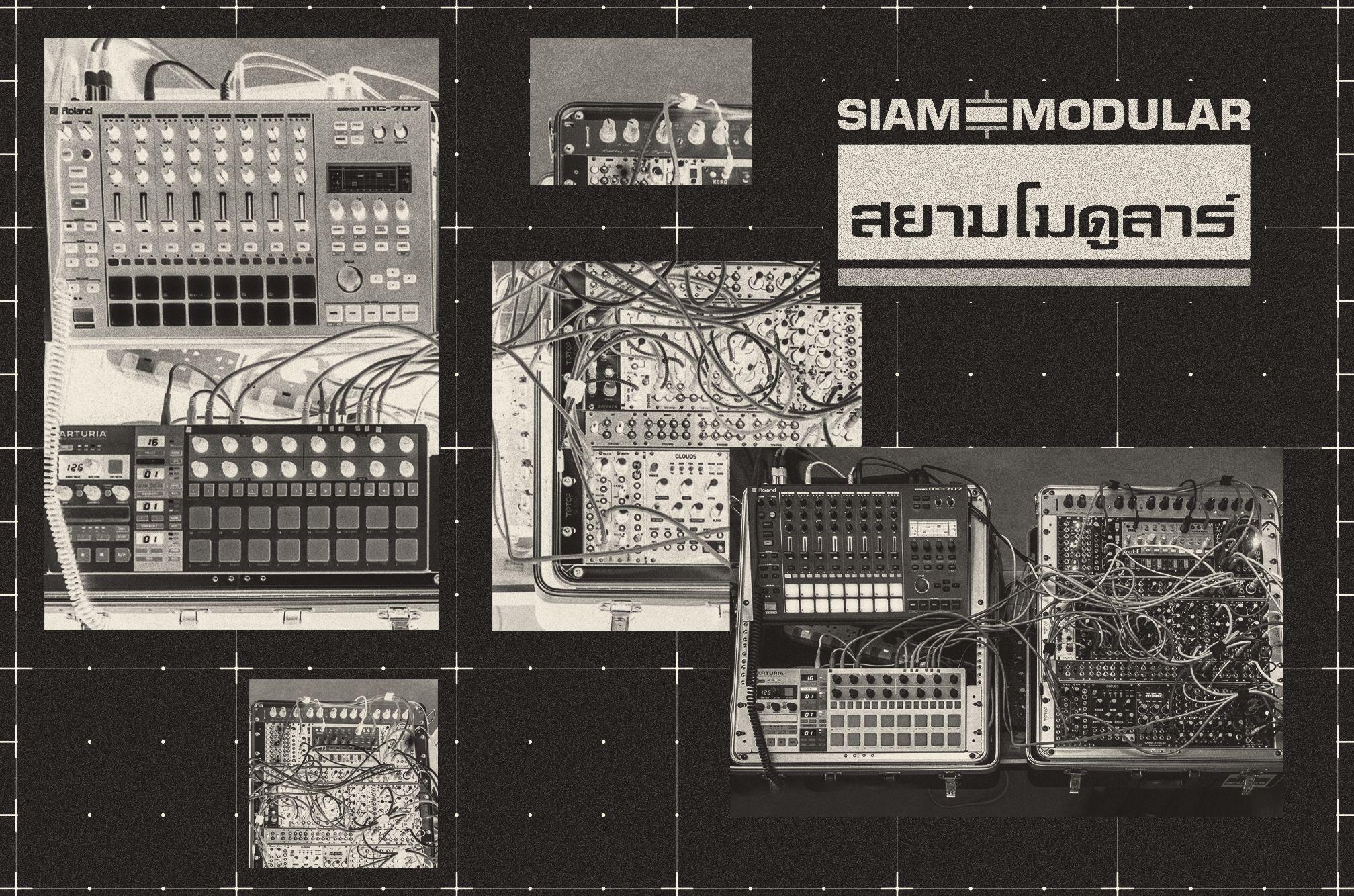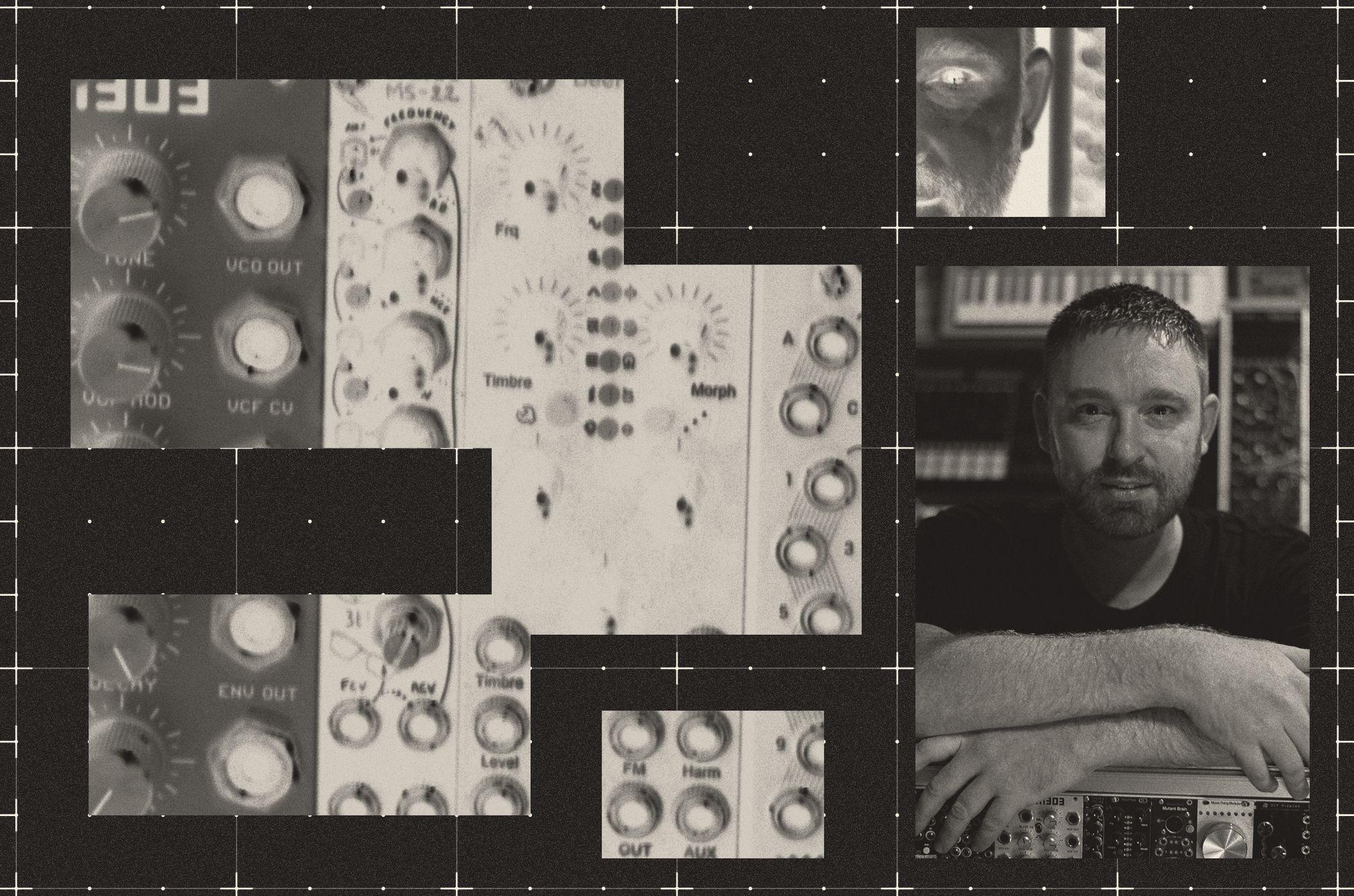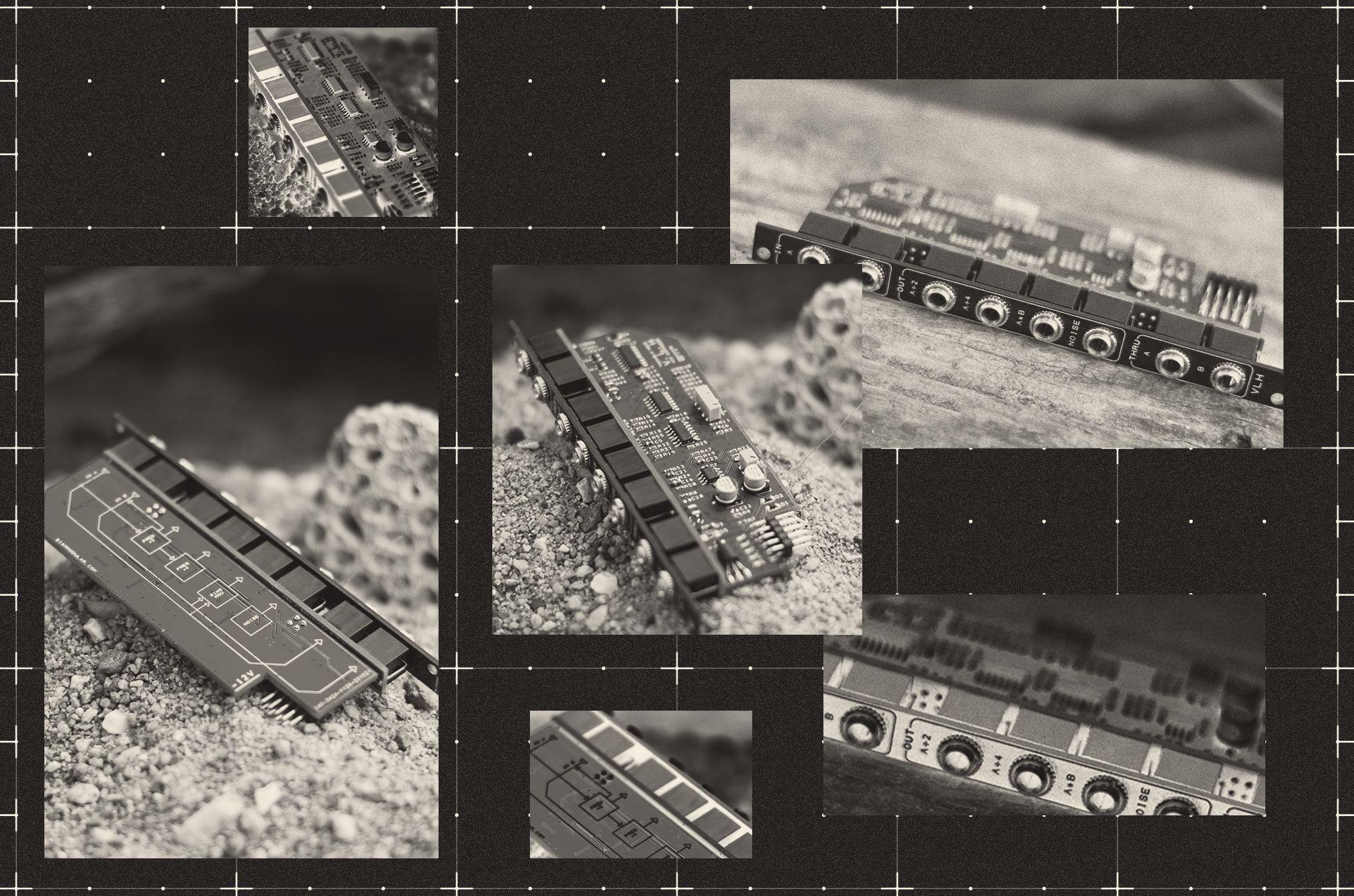 Features
Features
Meet Siam Modular, Thailand's first modular synthesizer company
SynthAsia is a new mini-docu series on synth & modular culture in Asia
Introducing SynthAsia: a collaborative video series between CFK Productions and Mixmag Asia which focuses on synthesizer culture, from modular to traditional, across Southeast Asia.
From meeting modular builders, and exploring their environments to diving into their creative and music productions, SynthAsia aims to spotlight both established and lesser-known protagonists who dedicate their lives to the modern craft.
The first episode of SynthAsia takes us to Chiang Mai, Thailand, where we speak with Pete Wallis of Siam Modular, Thailand’s first modular synthesizer company. Siam Modular also hosts parties and is a leader in the Thai modular synth community.
Read this next: The joy of modular: getting deep into Asia's extraterrestrial synth scene
Watch the video and read the interview below.
Every record tells a story, what record tells yours?
It only tells the start of the story, but hearing The Prodigy Experience in ‘92 was like lighting the touch paper for everything I’ve ever done in music since. There were other influences, sure, but Experience really sums up that time for me. As for the whole story, that’s perhaps a record I’m yet to write.
Who are your musical influences?
In terms of influence on production, I probably draw more inspiration from the kit than I do from artists or tracks. A well-thought-out piece of gear just vibes, it’s like having another member of the band at the jam session to bounce off. But I know you are looking for music, damn there are so many…
I already mentioned The Prodigy, I’m gonna drop in Hardfloor too. Both of these in their own way do something with energy and motion in their music that set them apart from some of their contemporaries. There’s been a whole host of hardcore and jungle artists/DJs who’ve influenced me, then there’s a load of hard energy, acid trance and of course the London acid techno pioneers, D.A.V.E The Drummer, Chris Liberator, et al. In more recent years I’ve been listening to a lot of the amazing, intelligently produced electro and acid that’s out there. Again too many artists to mention but I’ve been buzzing off the likes of James Shinra, Lou Karsh, Arctor, Cignol, Fasme, EOD, Mnlth, the list goes on…
Read this next: Sound constellations: how Tangerine Dream made ambient masterpiece ‘Raum’
What makes you nostalgic?
Actually, 2022 was a very nostalgic year. Bittersweet; many beautiful moments but also a lot of death, unfortunately. A family member and two good friends didn’t make it, so a lot of looking back, thinking about all the good times and of course all the music we shared. We lost two very talented and thoroughly excellent individuals from our old Newcastle crew; Phil Cogan and DJ Reewynd R.I.P.
I produced and engineered quite a bit of UK hard house and hard energy with Phil so that’s been taking me back recently, also some of the radio shows we did as a crew capture not only the music we were into at the time but also the pattern. It’s probably not of interest to anyone outside our closer circle but I’m so glad it’s all secured in time for us to listen back to.
Musically I’m pretty nostalgic anyway, I still mix a lot of old school into my DJ sets and all those tunes have memories and often layers of nostalgia attached. Sorry if you were wanting specific records here; it’s hard to pin down a couple of tracks or albums after half a lifetime punctuated by music.

You are seen as Thailand's first modular synth company and more are now popping up. Do you think the Siam Modular store would ever carry any other Thai-made modular brands?
True, there are some very talented designers in Thailand, one of whom is Voxmachina. Pedro has released his series of awesome analogue designs as open source and they’ve been attracting attention from the DIY community. We are pleased to announce we’ll be stocking both the Voxmachina PCBs for DIY builders and the completed modules on the Siam Modular website. It’s been fun sharing a stage with Pedro at a few gigs recently, his music ranges from atmospheric to playful to at times banging electronica and his modules sound great!
You are originally from Newcastle but now run Siam Modular in Chiangmai, Thailand. What made you decide to go abroad and when did the idea of going to a country on the other side of the world first come to mind?
I had an interest in Asia and Asian culture as some of my earliest memories. I couldn't have been much older than 5 when a family friend started teaching judo at our school. In the same room of our home that we used to practise after class, I also remember my first tastes of various Asian cuisines.
When I finally went to Asia, I was kinda hoodwinked (unintentionally) by a friend. She wanted to go to Borneo to volunteer for the Orangutan Foundation and needed someone to go with. We were very close to our trip when she found out she was pregnant and had to cancel on me, but six weeks of hard work and simple living in a hut above a Kalimantan swamp was nice. Funny how all the background noise of life fades away when you don’t have a phone or the internet. I got some true clarity to contemplate what I might do and where I’d go next after travelling.
Do you think you would have started a modular synth company had you still been in the UK?
No idea what I’d be doing if I was still in the UK. I’ve had three kids since coming to Asia so my life is completely different now. But after settling down and knowing that I was no longer going to be nomadic the logical progression was to put together a studio again, so the path could well have looked the same wherever I was. I’d certainly be producing so I’d be building bits and pieces for the studio too, either as work or as a hobby.
Read this next: The 10 most influential synths of all time
What is it like having your hobby also be your job?
I’m someone who can’t help but take his hobbies seriously. Having a young family you get a guilt trip indulging too much time on something that doesn’t make money or at least have some practical utility, so things kind of have to evolve either into a trivial knock-around or a serious enterprise.
Really Siam Modular still feels like a hobby that also pays the bills. I always thought producing music would be difficult for me to make into a profession as there’d need to be so much compromise creatively, but here many of the modules that get to the design stage are based on my own impulse or needs. Thinking about the market – at least in the earlier days – came second and luckily there are enough ideas that I can usually find one to satisfy both my creative and business heads.
How does Siam Modular decide which products to create and does playing live (as Red Drum) influence the development of your modules?
Many of the modules are things I need in my own system or sometimes circuits I want to develop in order to learn more about a certain aspect of synth design. Others like the VLH are collaborations or ideas pitched to me that I’ve liked enough to go with.
However, when I set out building synths and even in the early Takaab days, my focus was on tools for the studio; playing live with modular has changed that direction somewhat. Our VCO for instance, had to be analogue but also had to be stable enough to take on the road and stay in tune during a performance. We also added a +/-5 octave switch specifically so they could be assigned quickly to a certain musical function even if the sequencer controlling it was a little basic. This live influence should cut through even more in our next generation of modules; we have a couple of small tools designed specifically to make life easier playing live and also one or more sequencers in development with a big focus on being used for gigs.
Listen to Arne speak to Red Drum on The CFK Show, on FM Belowground below.
You have a line of Takaab Modules, what are the fundamental characteristics of this line?
Right now there are loosely two suites of modules within the Takaab range: An analogue mono-synth voice and a set of (mostly passive) utility modules. The mono-synth - at least at the outset - was more about my own journey through synth design while I studied and applied each component circuit of a synthesizer. The business kind of took over though; my hands became full with management, sales and admin tasks while a talented technician on the team took over the design of some of these modules. But I’m happy that the resulting suite is a team effort, and it’s a clean, warm-sounding synth voice, using mostly analogue hardware, and importantly all analogue with regards to audio signals.
The utility stuff we do is really our bread and butter. Eurorack in general has a huge markup, but that’s fair because you are paying for months of development of something that will sell a relatively small number of units. However, it didn’t seem fair to me that some of the utilities that everyone needs that use very basic, boiler-plate circuits and you can design in a day or two often have the same high markup. So our utility modules were able to be very affordable. They are the glue in a rack that everyone needs to make their more exciting modules work and play well together, but no one wants to break the bank by acquiring them.
In the video we saw your crossover collaboration with Steve O'Hear when it came to creating the VLH module, do you have any other cool collaborations planned for the future?
Hopefully, it doesn’t come across that Takaab is a bit of a one-man band because that wouldn’t be accurate. On top of the awesome staff at HQ there’s a lot of collaborating and design scrutiny going on behind the scenes with people far more experienced in this game than myself.
The fruits of some similarly beautiful collaborations to the VLH will hopefully be announced through 2023, including the aforementioned sequencers. One of these sequencers is a project with my friend Jim Grant – another lockdown collaboration. Jim is retired but has had a fascinating career, lecturing Music Information Technology at City University of London while also maintaining Fairlights and being involved with prototyping the SMPTE/timecode for the early Akai S-series samplers. The nuts and bolts of this project really are all Jim’s work with me offering knowledge of current trends and a user perspective with regard to function, as well as designing the front panel and layout.
Read this next: "Music is one thing our planet produces while rotating": Bottlesmoker play electronic music for plants, by plants
You obviously have an aptitude when it comes to technical skills like soldering, were you always into electronics growing up?
Really I’m more of a creative person at heart, technical projects are usually inspired by a need for a certain tool to create music or art, but there has still been a strong technical influence all my life. My Dad is a retired electronic engineer and all-round technical wizard, as is my oldest brother. Making and mending was always a thing in our house and I’ve been burning my fingers with a soldering iron since… well, probably before I was old enough to be given a soldering iron. He’d always bring computers home from work too, so we’d usually have a PC to mess around with going back to before Windows.
At university and his subsequent career my Dad specialised in digital electronics. It’s so much fun designing with those old logic chips but a lot of it is basically obsolete now; it makes way more sense to do most of it with a microcontroller and a few lines of code. But this hasn’t stopped me designing a sequencer with that technology and it’s been good having someone on the other end of zoom who can check things over, simplify them or plain jump in and design chunks of the circuit when I’m banging my head off the desk!

Buying Modular synths can be a little complex to outsiders, what advice would you give to someone thinking of getting into it? What's a good starting point?
Why are you getting into modular? Eurorack is a flexible system you can use to create any bespoke piece of music equipment you want, from a synthesizer to a groovebox to an effects chain or pedal board; there are even eurorack modules that deal with video synthesis. Know what it is you are aiming for and make a plan to achieve that. This should likely include comparing any possible non-modular solutions as well. If your aim is to cover an entire wall of your home until it looks like the control room for the Deathstar, that’s cool too, but maybe warn your children that there won’t be much inheritance.
On a technological and technical level, what are the most challenging things about developing modules?
Right now it’s the semiconductor shortage which has sadly closed down a number of modular manufacturers worldwide. Luckily we are so small we have been able to be flexible, but for the last couple of years it has still been a pain to source certain parts for production, and this has also affected our design. We’ve had to take into account which projects are viable to continue developing based on the parts they use, and in some cases change designs to use more available parts.
In five words, describe your music.
Raw, electronic, funky, energetic & old-skool.
What’s your earliest memory with music?
My parents had this Technics automatic turntable so my brothers and I used to play their records. My Mum’s collection was mostly Beatles and Abba; my Dad’s was more Queen, Led Zeppelin, Pink Floyd, Simon & Garfunkel... but what stuck out the most was his copy of Jeff Wayne’s War of The Worlds. The music and story combined with the artwork were genuinely eerie and affecting, especially at a young age but Ken Freeman’s other-worldly synth patches, crossing over from the musical into more descriptive, narrative sound effects were like nothing I’d heard before.
Also, it was the mid-80s so to this day hear bands that were popular and got a lot of radio play at the time like Madness, Depeche Mode, Human League, Pet Shop Boys, Tears for Fears, Eurythmics, Duran Duran, etc take me right back to car journeys with the family.
Read this next: Modular mystic: Caterina Barbieri is unlocking the spirituality in synths
What’s the most significant evolution you’ve personally experienced/witnessed in Asia’s music scene since you first started in it?
I can only really talk about Thailand and even then as a relative outsider for most of my stay. But in terms of evolution, there have been two Cretaceous-scale extinction events since I arrived. I hadn’t been in Chiang Mai even six months when the 2014 protests and subsequent coup d'état occurred. Before that I’d had some heady nights in Bangkok partying into the small hours but all that changed overnight. Neither Chiang Mai nor Bangkok ever got back to their former glory. When covid hit, we were still reeling from the economic damage of lockdown as well as this somewhat puritan flex the authorities are on which is seemingly out-of-step with the locals, at least those who I meet.
But I am cautiously optimistic; festivals have been back with a vengeance so that’s encouraging. Tourism in general still needs a bolster despite recent growth, so I’d like to think they might consider some concessions on licensing laws in certain areas to get things going. Legalization is something to be positive about too; providing it actually works out it will be interesting to see how cannabis affects the shape of things to come in the Thai music scene.
What’s one thing the world doesn’t know about Asia’s music scene?
Talking about Thailand specifically again. Visitors are often surprised by the scope, the vibrancy and just how damn-right creative the music can be here in Thailand (Sorry that’s three things). It’s common for Thai music lovers to be almost dogmatically indie in their tastes which make for some very cool underground sub-scenes with musicians and DJs who aren’t afraid to try things out. In fact, there’s quite a history of experimental music here, and the Eurorack thing builds on that. People from outside Thailand are often surprised that there’s a modular scene at all, but there is a lot of talent here so there certainly is a scene; one that while perhaps relatively small is nevertheless perfectly formed.
Favourite Thai food?
Right now it’s all about the gaeng pet.


